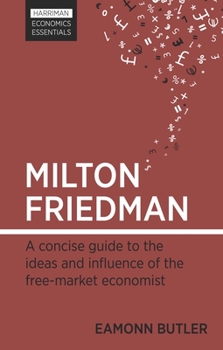Milton Friedman: A Concise Guide to the Ideas and Influence of the Free-Market Economist
Select Format
Select Condition 
Book Overview
"One of the most important economic thinkers of all time"
- Paul Krugman
Format:Paperback
Language:English
ISBN:0857190369
ISBN13:9780857190369
Release Date:April 2011
Publisher:Harriman House
Length:162 Pages
Weight:0.55 lbs.
Dimensions:0.4" x 5.5" x 8.5"
Customer Reviews
1 rating
Friedman 101.
Published by Thriftbooks.com User , 21 years ago
I was drawn back to Eamonn Butler's 1985 book while working my way through the latest venture by Brian Snowdon and Howard Vane. Almost twenty years after the publication it still seems as fresh as ever and should still be considered the best introductory work about Milton Friedman particularly for the student.Given the advances in macroeconomics which have taken place since the 1970s, an era now fading away thankfully into distant memory, it is not surprising that concerns about money continue to dominate the debate. World events, such as deflation in Japan and the tremendous efforts by Federal Reserve Governor Greenspan to prevent such an occurrence in the United States, continue to place the Friedman analysis and theory at the centre of the ongoing discussion.This magnificent little book has at it's centrepiece Friedman's work on Monetary Theory. Butler, writing from the position of a fellow free-marketeer does an outstanding job restraining his infectious free market self to provide an exemplary elucidation of Milton Friedman's writings and how they overcame sustained attack from the Keynesian orthodoxy to establish themselves as a counter-revolution. He does not assume much prior knowledge of the reader but seeks to establish with remarkable clarity Friedman's position and how he got there. He certainly does real justice to the nature of the attacks and examines their arguments carefully. Fairness is a good description of his approach. He is not afraid to bring in criticism from the Austrian school to show that attacks on Friedman's work are not only from the left.In the latter sections of the book he also looks at Friedman's position as a free marketeer and some of the policy proposals he has made and also in the final chapter, which for me was the most interesting he looks at some of the methodological issues generated by Friedman.One is reminded of the remark attributed to Popper that a theory which explains everything explains nothing when reading this chapter. Butler robustly defends Friedmans theorizing based on empirical evidence and casts aside the majority of objections to this approach. he chides those who make their models more and more complex to include new developments and candidly criticizes those economists who talk among themselves in the rarified realms of abtruse reasoning. As John Lennon once said, 'life is what happens when you are busy making other plans'. There is one issue where Butler concurs that Friedman's theory is open to attack and that is on the question of adjustment costs involved in relative price changes as a result of a monetary diturbance.I am not convinced that the final chapter should not have been the first but it certainly fits nicely into the logic of the book that Eamonn Butler has written so well.This is a book that is enthusiastically recommended for any student of economics or even just an interested reader. Should also be required reading for anyone going into public service for the first time bu





